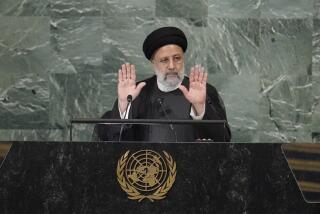Progress cited on Iraq pact
- Share via
BAGHDAD — Iraq’s foreign minister said Wednesday that concessions by both sides had advanced the prospects for a new security agreement needed for U.S. forces to remain in the country beyond the end of the year.
Seeking to dispel criticism that the agreement would infringe on Iraqi sovereignty, Foreign Minister Hoshyar Zebari said the opposition was based on “misrepresentations, confusion and politicizing.”
The agreement being negotiated would be in effect only one or two years and it would not sanction any permanent U.S. bases, Zebari said at a news conference.
“That’s why this is not, as it has been misrepresented, another colonization of Iraq binding Iraq to a colonial agreement like the British Anglo-Iraqi agreement of the 1930s,” he said.
Zebari indicated that progress had been made on several thorny issues, including the existing immunity from prosecution for the U.S. military and private contractors and the internment of Iraqi citizens by U.S. forces.
He said Washington had dropped its demand for continued immunity for contractors. U.S. officials have said they are not willing to allow trials of U.S. service members in Iraqi courts.
Zebari described those as examples of issues on which progress was being made.
Acknowledging that remaining differences could delay an agreement, he said the government had short-term options, such as a memorandum of understanding to keep U.S. troops in the country under existing rules.
The U.S. has made it clear that its forces would not remain in Iraq without some legal foundation, he said. The United Nations mandate for their presence expires at the end of this year, and Zebari said one option would be seeking an extension.
Zebari briefed members of parliament on the negotiations Tuesday. He said Wednesday that he thought he had been able to dispel some of the misunderstanding. But some ministers weren’t satisfied.
“He was like an American negotiator and not an Iraqi one,” said Rashid Azzawi of the Iraqi Islamic Party, part of the main Sunni bloc. “He didn’t specify many details.”
A supporter of anti-U.S. cleric Muqtada Sadr said there was still a consensus in parliament to reject the agreement.
“It is an unequal convention between an occupier and an occupied country,” said Nassar Rubaie, chief of the Sadr bloc.
Elsewhere, U.S. and Iraqi forces Wednesday arrested three members of the Maysan provincial council and 18 of the provincial Gov. Adil Maliki’s guards as part of a campaign to restore government control in the provincial capital, Amarah, about 190 miles southeast of Baghdad, police said. The arrests were made at the governor’s house.
Also arrested on suspicion of involvement with Shiite militias were the chairman of the provincial council, Abdul Jabar Waheed, and council members Abdul Latif Jawad and Fadhl Nimaa, all members of the Sadr movement.
In Baghdad, two Iraqis were killed and 10 injured by a mortar attack in the Amil neighborhood. A policeman was killed and three were wounded by a roadside bomb in east Baghdad, police said.
--
Times staff writer Saif Hameed and special correspondents in Baghdad and Amarah contributed to this report.
More to Read
Sign up for Essential California
The most important California stories and recommendations in your inbox every morning.
You may occasionally receive promotional content from the Los Angeles Times.











